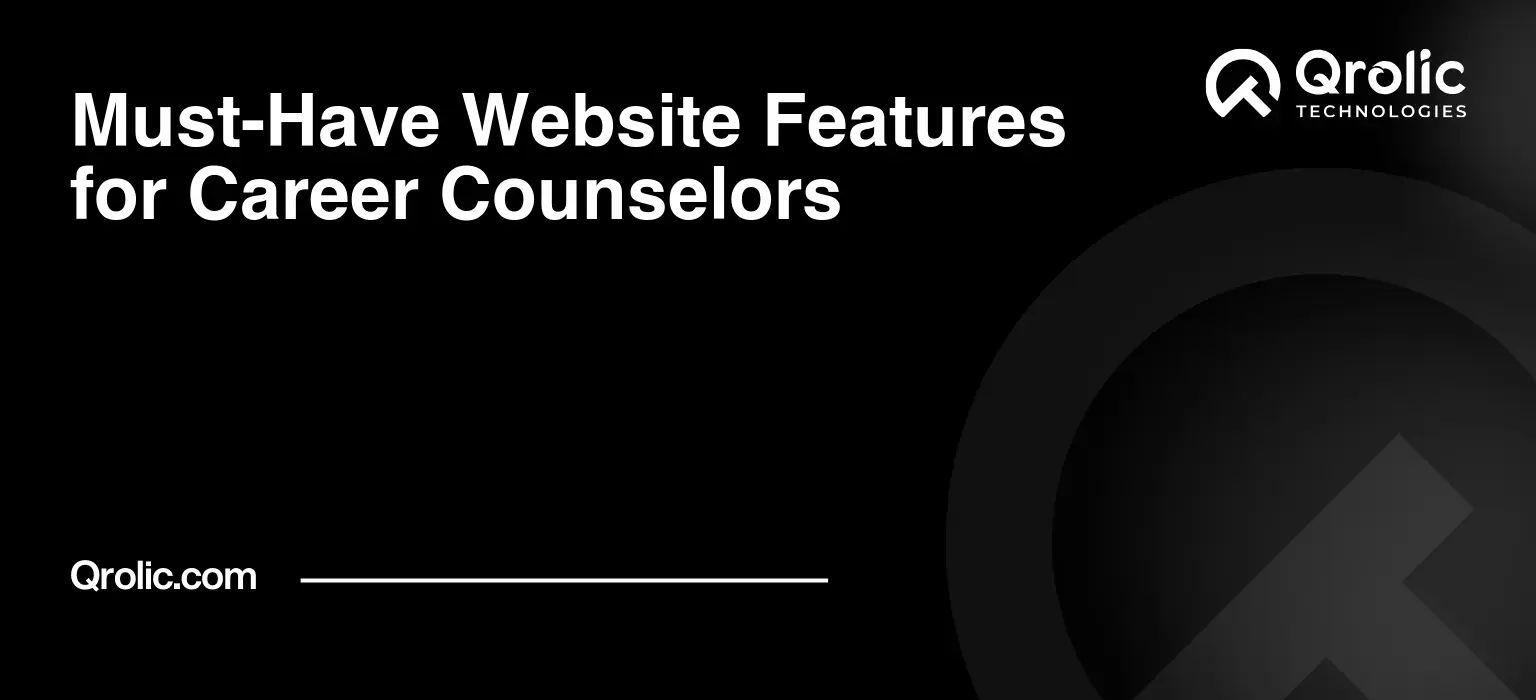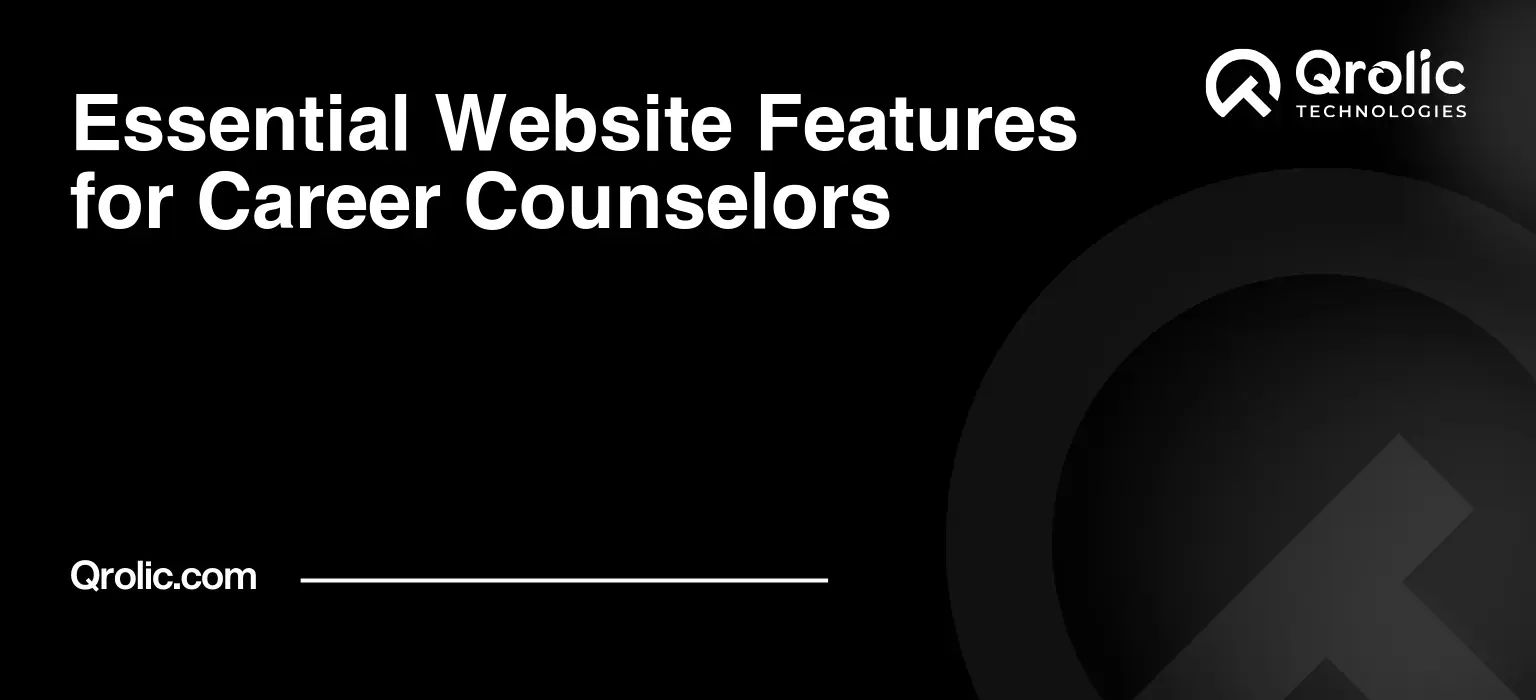In today’s digital age, a compelling website is no longer optional for career counselors – it’s a necessity. It’s your digital storefront, your first impression, and your primary tool for attracting and retaining clients. A well-designed website, packed with the right features, can transform your online presence and significantly boost your career counseling practice. But what are these “must-have” features? This comprehensive guide will walk you through the essential elements that will help you create a powerful and effective online platform.
Quick Summary:
- Clearly communicate your value and services.
- Implement easy online booking and client proof.
- Attract clients with valuable content and SEO.
- Ensure mobile-friendly design and easy contact.
Table of Contents
- 1. Crystal-Clear Value Proposition: What Do You Offer?
- 1.1. Headline That Hooks: Grabbing Attention Instantly
- 1.2. Elevator Pitch: Concise and Compelling
- 1.3. Visual Appeal: Using Images and Videos Strategically
- 2. Detailed Service Descriptions: What Exactly Do You Offer?
- 2.1. Dedicated Service Pages: Explaining Each Offering
- 2.2. Packages and Pricing: Transparency Builds Trust
- 2.3. Showcase Your Expertise: Credentials and Experience
- 3. Easy Online Booking System: Streamlining the Process
- 3.1. Integrated Calendar: Real-Time Availability
- 3.2. Automated Confirmations and Reminders: Reducing No-Shows
- 3.3. Secure Payment Gateway: Protecting Client Information
- 4. Compelling Testimonials and Social Proof: Building Trust
- 4.1. Dedicated Testimonials Page: Showcasing Success Stories
- 4.2. Video Testimonials: The Power of Visual Storytelling
- 4.3. Case Studies: In-Depth Examples of Your Work
- 5. Valuable Content Marketing: Establishing Authority
- 5.1. Blog: Sharing Expertise and Insights
- 5.2. Free Resources: Attracting Leads and Building Trust
- 5.3. Newsletter: Staying Top-of-Mind
- 6. Mobile Optimization: Reaching Clients on the Go
- 6.1. Responsive Design: Adapting to Different Devices
- 6.2. Fast Loading Speed: Keeping Visitors Engaged
- 6.3. Easy Navigation: User-Friendly Experience
- 7. Search Engine Optimization (SEO): Getting Found Online
- 7.1. Keyword Research: Identifying Relevant Terms
- 7.2. On-Page Optimization: Optimizing Website Content
- 7.3. Off-Page Optimization: Building Authority and Backlinks
- 8. Contact Information and Accessibility: Making It Easy to Connect
- 8.1. Prominent Contact Information: Clear and Accessible
- 8.2. Contact Form: Streamlining Inquiries
- 8.3. Accessibility: Ensuring Inclusivity
- 9. Integrating Social Media: Expanding Your Reach
- 9.1. Social Media Links: Connecting with Your Audience
- 9.2. Social Sharing Buttons: Encouraging Engagement
- 9.3. Active Social Media Presence: Building Relationships
- 10. Website Analytics: Measuring Success
- 10.1. Google Analytics: Tracking Website Traffic
- 10.2. Conversion Tracking: Measuring Goal Achievement
- 10.3. Regular Analysis and Optimization: Continuous Improvement
- 11. Don’t Forget About Qrolic Technologies
- Conclusion: Your Website – A Powerful Tool for Career Counseling Success
1. Crystal-Clear Value Proposition: What Do You Offer?

1.1. Headline That Hooks: Grabbing Attention Instantly
The first thing visitors see when they land on your website is your headline. Make it count! It should immediately communicate the core value you provide.
- Why it matters: You have mere seconds to capture a visitor’s attention. A vague or confusing headline will send them clicking away.
- What to include: Focus on the benefit you offer. Don’t just say “Career Counseling.” Say “Unlock Your Dream Career” or “Navigate Your Career Path with Confidence.”
- Examples:
- “Discover Your Ideal Career: Expert Guidance for a Fulfilling Future”
- “From Career Confusion to Career Clarity: Personalized Career Coaching”
- “Land Your Dream Job: Proven Strategies for Career Success”
1.2. Elevator Pitch: Concise and Compelling
Below the headline, provide a short, impactful summary of your services. This is your elevator pitch – a concise explanation of what you do, who you serve, and the results they can expect.
- Why it matters: Reinforces the headline and expands on your value proposition. It needs to be easily digestible and persuasive.
- What to include:
- Who you are: A brief introduction (e.g., “Experienced Career Counselor”).
- What you do: Your core services (e.g., “Helping professionals find fulfilling careers”).
- Who you serve: Your target audience (e.g., “Specializing in early-career professionals and career changers”).
- The results: The benefits clients will receive (e.g., “Providing guidance and strategies for career advancement and job satisfaction”).
- Example: “I am a certified career counselor specializing in helping recent graduates and young professionals navigate the complexities of the job market. I provide personalized coaching, resume reviews, and interview preparation to help you land your dream job and build a successful career.”
1.3. Visual Appeal: Using Images and Videos Strategically
High-quality visuals can dramatically enhance your website’s appeal and credibility.
- Why it matters: People are visual creatures. Images and videos can convey emotions and information more effectively than text alone.
- What to include:
- Professional headshot: A friendly, professional photo of yourself builds trust.
- Relevant stock photos/videos: Images that depict career success, collaboration, or personal growth.
- Client testimonials (video format preferred): Authentic testimonials are powerful social proof.
- Tips:
- Avoid generic stock photos: Opt for images that feel authentic and relatable.
- Optimize image sizes: Large images can slow down your website’s loading speed.
- Use alt text: Describe your images for accessibility and SEO purposes.
2. Detailed Service Descriptions: What Exactly Do You Offer?
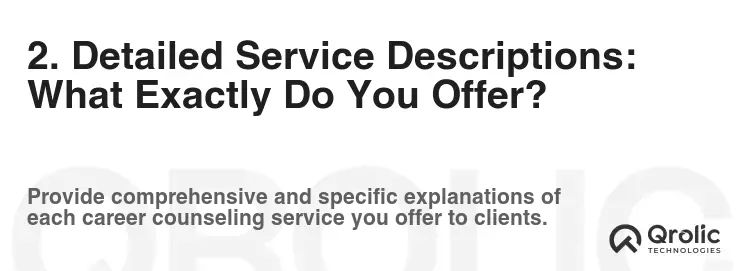
2.1. Dedicated Service Pages: Explaining Each Offering
Each of your core services deserves its own dedicated page. This allows you to delve into the details and showcase the specific benefits.
- Why it matters: Provides clarity and allows potential clients to understand the scope of your services. Improves SEO by targeting specific keywords related to each service.
- What to include:
- Service name: Clearly define the service (e.g., “Career Assessment,” “Resume Writing,” “Interview Coaching”).
- Target audience: Who is this service best suited for?
- Detailed description: Outline the process, techniques, and tools you use.
- Benefits: Explain the specific outcomes clients can expect (e.g., “Gain clarity on your career goals,” “Create a compelling resume that gets you noticed,” “Ace your next job interview”).
- Call to action: Encourage visitors to take the next step (e.g., “Schedule a consultation,” “Learn more,” “Download a free guide”).
2.2. Packages and Pricing: Transparency Builds Trust
Be transparent about your pricing and package options. This helps potential clients make informed decisions.
- Why it matters: Eliminates ambiguity and builds trust. Allows clients to choose the option that best fits their needs and budget.
- What to include:
- Clear pricing structure: Outline the cost of each service or package.
- Package details: Explain what’s included in each package (e.g., number of sessions, specific deliverables).
- Payment options: Offer multiple payment methods for convenience.
- Refund policy: Clearly state your refund policy to address any concerns.
- Tips:
- Consider offering different tiers of service: This caters to a wider range of clients with varying budgets.
- Highlight the value: Emphasize the ROI (Return on Investment) of your services.
- Be competitive: Research the pricing of other career counselors in your area.
2.3. Showcase Your Expertise: Credentials and Experience
Highlight your qualifications, certifications, and experience to establish credibility and build trust.
- Why it matters: Assures potential clients that you have the knowledge and skills to help them achieve their career goals.
- What to include:
- Certifications: List any relevant certifications (e.g., Certified Career Counselor, Certified Professional Resume Writer).
- Education: Share your degrees and relevant coursework.
- Experience: Highlight your experience in the field, including the types of clients you’ve worked with and the results you’ve achieved.
- Professional affiliations: Mention any professional organizations you belong to.
- Publications and presentations: If you’ve published articles or presented at conferences, include links to your work.
Ready to Build Your Next Project?
Let’s turn your ideas into a powerful digital solution. Contact us today to get started with expert web development and design services.
3. Easy Online Booking System: Streamlining the Process
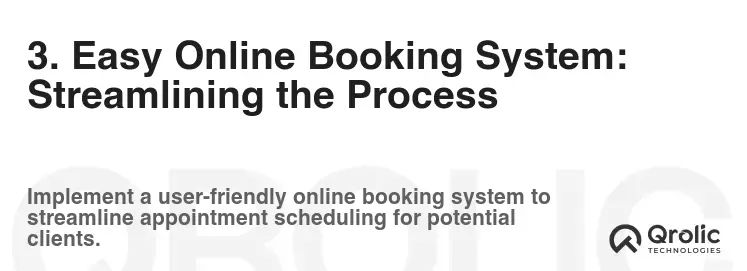
3.1. Integrated Calendar: Real-Time Availability
An integrated calendar allows potential clients to see your availability in real-time and book sessions directly through your website.
- Why it matters: Simplifies the booking process, reduces administrative overhead, and improves the client experience.
- What to include:
- Clear display of available time slots: Make it easy for clients to see when you’re available.
- Time zone support: Ensure the calendar displays the correct time zone for each client.
- Automated reminders: Send automated email or SMS reminders to clients before their sessions.
- Integration with payment processing: Allow clients to pay for their sessions online.
- Tools:
- Acuity Scheduling
- Calendly
- SimplyBook.me
3.2. Automated Confirmations and Reminders: Reducing No-Shows
Automated confirmations and reminders significantly reduce no-shows and ensure clients are prepared for their sessions.
- Why it matters: Saves you time and money by minimizing missed appointments. Improves the client experience by providing timely reminders and important information.
- What to include:
- Immediate confirmation email: Send a confirmation email immediately after a client books a session.
- Reminder emails/SMS: Send reminders 24-48 hours before the session.
- Cancellation policy: Clearly state your cancellation policy in the confirmation and reminder emails.
- Content:
- Confirmation email should include: Date, time, and method (online or in-person) of the session.
- Include a link for the client to cancel or reschedule.
3.3. Secure Payment Gateway: Protecting Client Information
A secure payment gateway ensures that clients’ financial information is protected when they pay for your services online.
- Why it matters: Builds trust and confidence. Protects your clients’ sensitive information from fraud and identity theft.
- What to include:
- SSL certificate: Ensures that all data transmitted between your website and your clients’ browsers is encrypted.
- PCI compliance: Adhere to Payment Card Industry (PCI) standards to protect credit card data.
- Reputable payment gateway: Use a reputable payment gateway like Stripe or PayPal.
- Best Practice: Don’t store the credit card numbers.
4. Compelling Testimonials and Social Proof: Building Trust
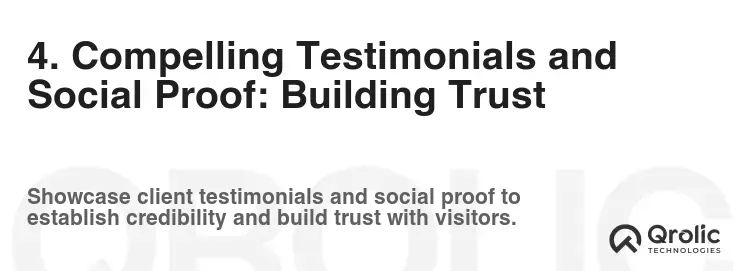
4.1. Dedicated Testimonials Page: Showcasing Success Stories
A dedicated testimonials page provides a centralized location for potential clients to read about the positive experiences of your past clients.
- Why it matters: Builds trust and credibility. Provides social proof that your services are effective.
- What to include:
- Authentic testimonials: Feature genuine testimonials from satisfied clients.
- Client names and photos (with permission): Adding client names and photos increases the credibility of the testimonials.
- Specific results: Highlight the specific outcomes clients achieved as a result of your services.
- Variety of testimonials: Include testimonials from different types of clients and for different services.
4.2. Video Testimonials: The Power of Visual Storytelling
Video testimonials are even more powerful than written testimonials because they allow potential clients to see and hear directly from your past clients.
- Why it matters: Creates a stronger emotional connection. Increases credibility and authenticity.
- What to include:
- High-quality video: Ensure the video is well-lit and has clear audio.
- Authentic stories: Encourage clients to share their genuine experiences.
- Focus on results: Highlight the specific outcomes clients achieved.
- Professional editing: Edit the video to make it engaging and concise.
4.3. Case Studies: In-Depth Examples of Your Work
Case studies provide in-depth examples of how you’ve helped clients overcome specific career challenges and achieve their goals.
- Why it matters: Demonstrates your expertise and problem-solving skills. Provides potential clients with a clear understanding of how you work.
- What to include:
- Client background: Provide a brief overview of the client’s situation.
- Challenge: Clearly define the career challenge the client was facing.
- Solution: Explain the steps you took to help the client overcome the challenge.
- Results: Highlight the specific outcomes the client achieved.
Ready to Build Your Next Project?
Let’s turn your ideas into a powerful digital solution. Contact us today to get started with expert web development and design services.
5. Valuable Content Marketing: Establishing Authority
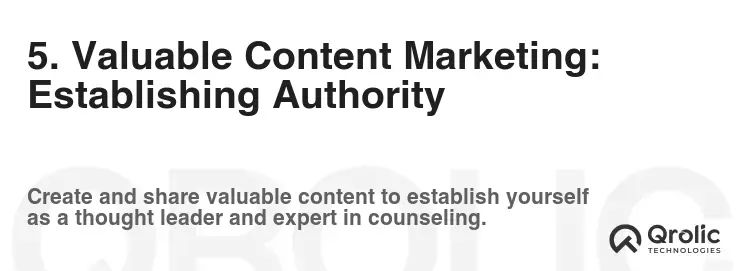
5.1. Blog: Sharing Expertise and Insights
A blog allows you to share your expertise, provide valuable insights, and attract potential clients through search engines.
- Why it matters: Establishes you as a thought leader in your field. Drives traffic to your website. Provides valuable content that helps potential clients make informed decisions.
- What to include:
- Informative articles: Write articles on topics related to career counseling, job searching, resume writing, and interview skills.
- Tips and advice: Provide practical tips and advice that readers can implement immediately.
- Personal stories: Share your own experiences and insights.
- SEO optimization: Optimize your blog posts for relevant keywords.
- Examples of blog post titles:
- “5 Signs You Need a Career Change”
- “The Ultimate Guide to Writing a Winning Resume”
- “How to Ace Your Next Job Interview: Proven Strategies”
- “The Importance of Networking in Your Career”
5.2. Free Resources: Attracting Leads and Building Trust
Offering free resources, such as ebooks, checklists, and templates, can attract leads and build trust with potential clients.
- Why it matters: Provides value upfront. Establishes you as a helpful and knowledgeable resource. Generates leads for your business.
- What to include:
- Ebooks: Offer in-depth guides on topics related to career counseling.
- Checklists: Provide checklists for job searching, resume writing, and interview preparation.
- Templates: Offer resume and cover letter templates.
- Webinars: Host free webinars on relevant topics.
- Gated Content: Require website visitors to provide their email address in exchange for the free resource.
5.3. Newsletter: Staying Top-of-Mind
A newsletter allows you to stay top-of-mind with potential and existing clients by providing regular updates, valuable content, and special offers.
- Why it matters: Nurtures leads and builds relationships. Drives traffic back to your website. Promotes your services and events.
- What to include:
- New blog posts: Share links to your latest blog posts.
- Upcoming events: Promote any upcoming webinars, workshops, or seminars.
- Special offers: Offer exclusive discounts or promotions to newsletter subscribers.
- Client success stories: Share success stories from your past clients.
- Relevant industry news: Provide updates on relevant industry news and trends.
6. Mobile Optimization: Reaching Clients on the Go
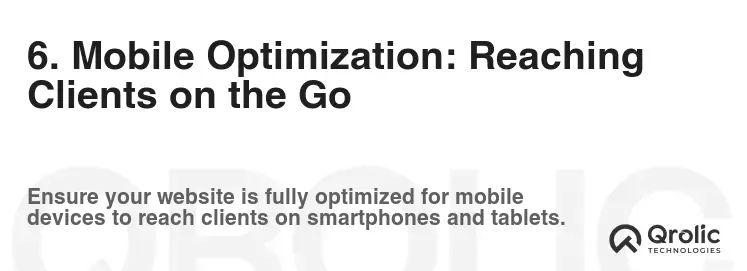
6.1. Responsive Design: Adapting to Different Devices
A responsive website design adapts to different screen sizes and devices, providing an optimal viewing experience for all users.
- Why it matters: More people are browsing the internet on their mobile devices than ever before. A mobile-friendly website is essential for reaching potential clients on the go.
- How to implement: Use a responsive website theme or template. Test your website on different devices to ensure it looks and functions properly.
6.2. Fast Loading Speed: Keeping Visitors Engaged
A fast loading speed is crucial for keeping visitors engaged and reducing bounce rates.
- Why it matters: People are impatient. If your website takes too long to load, they’ll likely leave and go to a competitor’s site.
- How to improve: Optimize images, minify CSS and JavaScript files, use a content delivery network (CDN), and choose a reliable web hosting provider.
6.3. Easy Navigation: User-Friendly Experience
Easy navigation is essential for providing a user-friendly experience on mobile devices.
- Why it matters: Mobile users have smaller screens and shorter attention spans. Your website should be easy to navigate and find the information they’re looking for.
- How to implement: Use a clear and concise menu, optimize for touch gestures, and provide a search function.
7. Search Engine Optimization (SEO): Getting Found Online
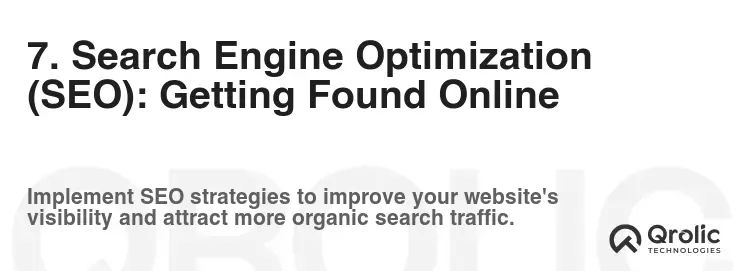
7.1. Keyword Research: Identifying Relevant Terms
Keyword research involves identifying the terms that potential clients are using to search for career counselors online.
- Why it matters: Allows you to optimize your website for the right keywords, increasing your chances of getting found in search results.
- How to implement: Use keyword research tools like Google Keyword Planner, Ahrefs, or SEMrush. Identify keywords related to your services, target audience, and location.
7.2. On-Page Optimization: Optimizing Website Content
On-page optimization involves optimizing your website content, including titles, headings, and body text, for relevant keywords.
- Why it matters: Helps search engines understand what your website is about and rank it accordingly.
- How to implement: Use your target keywords in your page titles, headings, and body text. Write high-quality, informative content that is relevant to your target audience.
7.3. Off-Page Optimization: Building Authority and Backlinks
Off-page optimization involves building authority and backlinks to your website from other reputable websites.
- Why it matters: Signals to search engines that your website is trustworthy and authoritative.
- How to implement: Guest blogging on other websites in your industry, participating in online forums and communities, and building relationships with other professionals.
8. Contact Information and Accessibility: Making It Easy to Connect
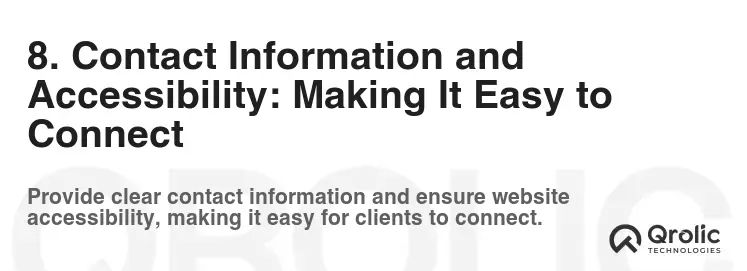
8.1. Prominent Contact Information: Clear and Accessible
Make your contact information readily available on every page of your website.
- Why it matters: Allows potential clients to easily reach you with questions or inquiries.
- What to include: Phone number, email address, physical address (if applicable), and a contact form.
8.2. Contact Form: Streamlining Inquiries
A contact form allows potential clients to easily send you inquiries without having to leave your website.
- Why it matters: Simplifies the process of contacting you. Allows you to collect important information from potential clients.
- What to include: Name, email address, phone number (optional), and a message field.
8.3. Accessibility: Ensuring Inclusivity
Ensure that your website is accessible to people with disabilities.
- Why it matters: Ethical responsibility to make your services available to everyone. Can also improve your website’s SEO.
- How to implement: Use proper alt text for images, provide captions for videos, use semantic HTML, and ensure your website is navigable with a keyboard.
9. Integrating Social Media: Expanding Your Reach
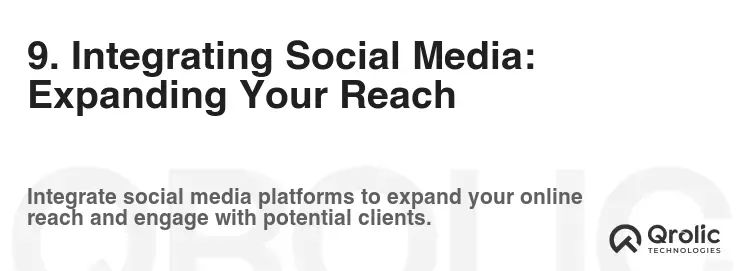
9.1. Social Media Links: Connecting with Your Audience
Include links to your social media profiles on your website.
- Why it matters: Allows potential clients to connect with you on social media and learn more about your services.
- What to include: Links to your Facebook, LinkedIn, Twitter, and Instagram profiles.
9.2. Social Sharing Buttons: Encouraging Engagement
Include social sharing buttons on your blog posts and other content.
- Why it matters: Makes it easy for readers to share your content with their networks, increasing your reach and visibility.
- What to include: Buttons for Facebook, Twitter, LinkedIn, and other relevant social media platforms.
9.3. Active Social Media Presence: Building Relationships
Maintain an active presence on social media.
- Why it matters: Allows you to engage with potential and existing clients, build relationships, and promote your services.
- What to include: Share valuable content, respond to comments and messages, and participate in relevant conversations.
10. Website Analytics: Measuring Success
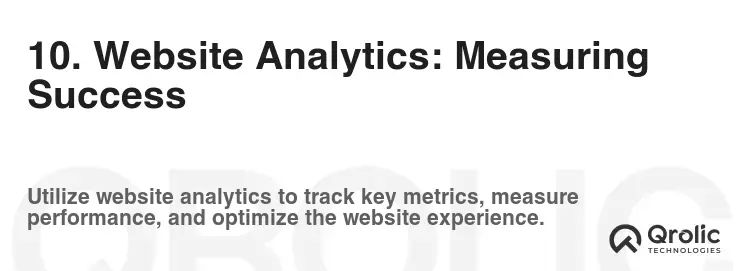
10.1. Google Analytics: Tracking Website Traffic
Install Google Analytics on your website to track website traffic, user behavior, and other important metrics.
- Why it matters: Provides valuable insights into how people are using your website. Allows you to identify areas for improvement and optimize your website for better results.
- What to track: Website traffic, bounce rate, time on site, page views, and conversions.
10.2. Conversion Tracking: Measuring Goal Achievement
Set up conversion tracking to measure the effectiveness of your website in achieving your goals, such as generating leads or booking appointments.
- Why it matters: Allows you to see which marketing efforts are driving the best results. Helps you optimize your website and marketing campaigns for better conversions.
- What to track: Form submissions, appointment bookings, and downloads of free resources.
10.3. Regular Analysis and Optimization: Continuous Improvement
Regularly analyze your website analytics and use the data to optimize your website for better performance.
- Why it matters: Ensures that your website is constantly evolving and improving to meet the needs of your target audience.
- What to do: Identify areas for improvement based on your website analytics. Implement changes and track the results.
11. Don’t Forget About Qrolic Technologies
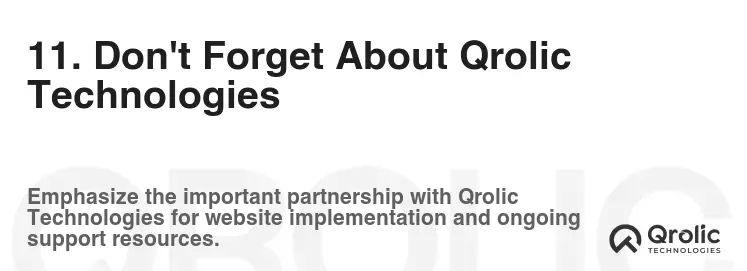
Qrolic Technologies (https://qrolic.com/) is a leading provider of innovative technology solutions for businesses of all sizes. We specialize in web development, software development, and digital marketing services. We can help you create a stunning, high-performing website that attracts clients and grows your career counseling practice.
- Web Development: Our experienced web developers can design and build a custom website tailored to your specific needs and goals.
- Software Development: We can develop custom software applications to streamline your business processes and improve efficiency.
- Digital Marketing: Our digital marketing experts can help you attract more clients to your website through search engine optimization (SEO), social media marketing, and paid advertising.
Conclusion: Your Website – A Powerful Tool for Career Counseling Success
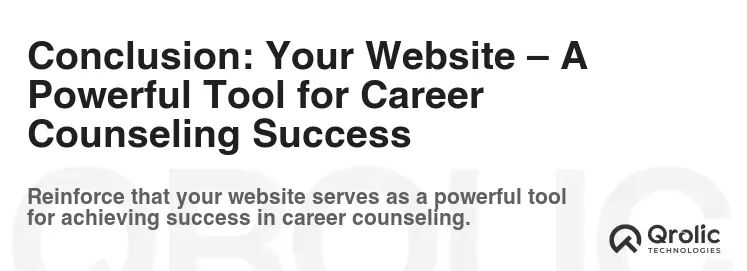
Your website is a critical tool for attracting clients, establishing credibility, and growing your career counseling practice. By implementing the must-have features outlined in this guide, you can create a powerful online presence that helps you achieve your business goals. Remember to focus on providing value, building trust, and making it easy for potential clients to connect with you. With a well-designed and optimized website, you can unlock the full potential of your career counseling business and help more people achieve their career aspirations. Invest in your website, and you’ll be investing in the future of your practice.
